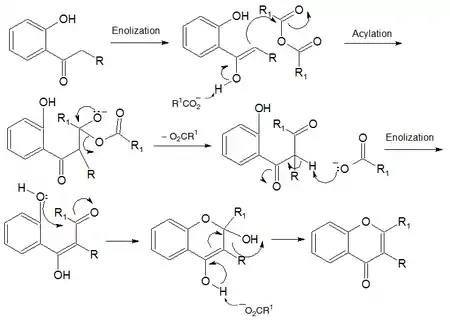Allan–Robinson reaction
The Allan–Robinson reaction is the chemical reaction of o-hydroxyaryl ketones with aromatic anhydrides to form flavones (or isoflavones).[1][2][3][4]
If aliphatic anhydrides are used, coumarins can also be formed. (See Kostanecki acylation.)
 Reaction overview
Reaction overview
Mechanism
The o-hydroxyaryl ketone first undergoes tautomerization to form the respective enol. The pi electrons of the double bond then attack the electrophilic carbon of the anhydride; a carboxylate anion is subsequently lost as a leaving group. The carboxylate anion then attacks an alpha hydrogen to form an enol. The nucleophilic hydroxyl group then attacks the carbonyl carbon to form a six-membered heterocyclic ring. A proton is abstracted from the hydroxyl group of the enol to form a ketone, and the remaining hydroxyl group is lost as a leaving group in a concerted step to afford the final product.[4][5]
References
- Allan, J.; Robinson, R. J. Chem. Soc. 1924, 125, 2192.
- Dyke, S. F.; Ollis, W. D.; Sainsbury, M. J. Org. Chem. 1961, 26, 2453. (doi:10.1021/jo01351a072)
- Wheller, T. S. (1952). "Flavone". Organic Syntheses. 32: 72. doi:10.15227/orgsyn.032.0072.
- Jie Jack Li (2009). Name Reactions. A Collection of Detailed Reaction Mechanisms 4th Edition. Berlin, De: Springer. ISBN 978-3-642-01052-1.
- Graham, Solomons, T. W. (17 January 2013). Organic chemistry. Fryhle, Craig B.,, Snyder, S. A. (Scott A.) (11e ed.). Hoboken, NJ. ISBN 9781118147399. OCLC 820665397.
{{cite book}}: CS1 maint: location missing publisher (link) CS1 maint: multiple names: authors list (link)
